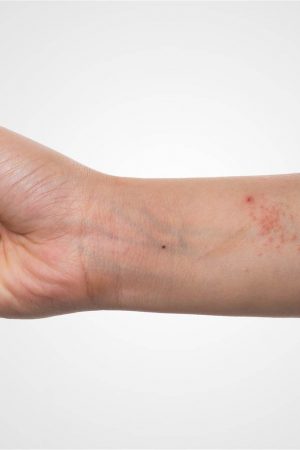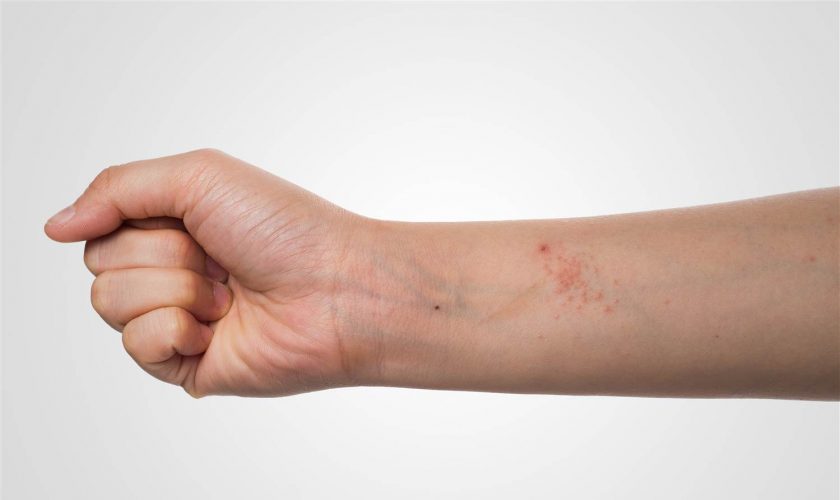Rather than a specific health condition, eczema is a reaction pattern that the skin produces in a number of diseases. It begins as red, raised tiny blisters containing a clear fluid atop red, elevated plaques. When the blisters break, the affected skin will weep and ooze. In older eczema, chronic eczema, the blisters are less prominent and the skin is thickened, elevated, and scaling. Eczema almost always is very itchy.
Symptoms
Eczema is characterized by itchy, dry, rough, flakey, inflamed, and irritated skin. It can flare up, subside, and then flare up again. It can occur anywhere but usually affects the arms, inner elbows, backs of the knees, or head (particularly the cheeks and the scalp). It is not contagious and becomes less severe with age.
Red or brownish-gray patches are common symptoms. Small, raised bumps that ooze fluid when scratched are another symptom. Scratching causes them to become crusty, which can signal infection. Thickened, scaly skin is another symptom.
Eczema can cause intense itching. Scratching further irritates and inflames the skin. This can cause infections that must be treated with antibiotics.
Causes
The exact cause of eczema is unknown, but it’s thought to be linked to an overactive response by the body’s immune system to an irritant. It is this response that causes the symptoms of eczema.
In addition, eczema is commonly found in families with a history of other allergies or asthma. Also, defects in the skin barrier could allow moisture out and germs in.
Some people may have “flare-ups” of the itchy rash in response to certain substances or conditions. For some, coming into contact with rough or coarse materials may cause the skin to become itchy. For others, feeling too hot or too cold, exposure to certain household products like soap or detergent, or coming into contact with animal dander may cause an outbreak. Upper respiratory infections or colds may also be triggers. Stress may cause the condition to worsen.
Although there is no cure, most people can effectively manage their disease with medical treatment and by avoiding irritants. The condition is not contagious and can’t be spread from person to person.
Treatment
Treatment for eczema can be managed at home by changing laundry detergents or soaps that may be causing the irritant. Avoid tight-fitting or rough clothing. Avoid scratching the affected area. Medical treatment include prescription anti-inflammatory medications, and steroid creams. Antibiotics may have to be prescribed to clear the affected irritation. Anti-itch creams, especially those containing hydrocortisone, may be helpful, but many experts recommend avoiding topical diphenhydramine and topical anesthetics because of concern of becoming sensitized and developing a secondary allergic contact dermatitis in reaction to these medications. Anti-itch creams containing pramoxine and menthol may be safer in this regard.
Remedies
Although separate conditions, eczema and psoriasis share the symptoms of painfully dry, tight, and itchy skin. Thankfully, these home remedies have been proven to alleviate symptoms and offer some much needed relief to your stressed skin.
Dry It Up With Salt
While this advice may seem counterintuitive, treating the oozing blisters with sea salt spray may help to ease the terrible itching. Simply add a teaspoon of sea salt to a cup of warm water and stir to dissolve the salt. Add to a spray bottle and spray on affected skin. Or, if you’re within range of a beach, try taking a dip in the ocean. Many eczema sufferers have reported that being immersed in the surf gave them temporary relief from their symptoms.
Take a Chamomile Bath
As we mentioned, chamomile offers soothing properties to the skin, and chamomile tea is not only relaxing to drink, it can be used as a bath additive to create a healing chamomile bath.
Make a Poultice
This is another great option if you don’t want to or are unable to submerge yourself in water during an eczema flare-up. A poultice is basically a paste made of herbs, clays, activated charcoal, salts or other beneficial substances that is wrapped in a piece of cloth and placed on the skin. A waterproof layer of plastic or waterproof cloth can also be added, and the poultice is left on for several hours at a time and changed several times a day.
Apply Vitamin E Oil
Applying vitamin E oil, especially natural D-alpha tocopherol with mixed natural tocopherols, can help relieve eczema symptoms. It’s important to avoid synthetic vitamin E oil, so be sure to read those labels closely or do your research beforehand.
Hempseed Oil
Hempseed oil has been shown in studies to help heal skin conditions, including eczema, as well as rashes and psoriasis. It’s believed to work because it contains a high level all fatty acids which affect immune responses in the body that can help promote healing, which is also likely to do with its ideal balance of omega-6 and omega-3 fatty acids. For relief, it’s a good idea to use it both internally and externally. Studies have shown that consuming it helps improve blood levels of essential fatty acids which can help heal from within, while applying it to the skin can relieve dryness and itchiness, reducing the need for medications.
Turmeric
Studies have linked this spice to reduced inflammation in a number of skin conditions, including psoriasis. Curcumin, an antioxidant found in turmeric, has been shown to protect skin by neutralizing free radicals and reducing wound-healing time. To achieve benefits, aim to take in about a teaspoon of turmeric every day. It has a subtle, citrusy flavor that works well in rice, veggies, pasta, and other cooked meals.
Tea Tree Oil
Rub a few drops of tea tree oil, diluted in a little olive oil, into your dry skin or psoriasis patches several times a day. The Australian remedy is useful for relieving itch and softening plaques, especially if you have a mild case.



